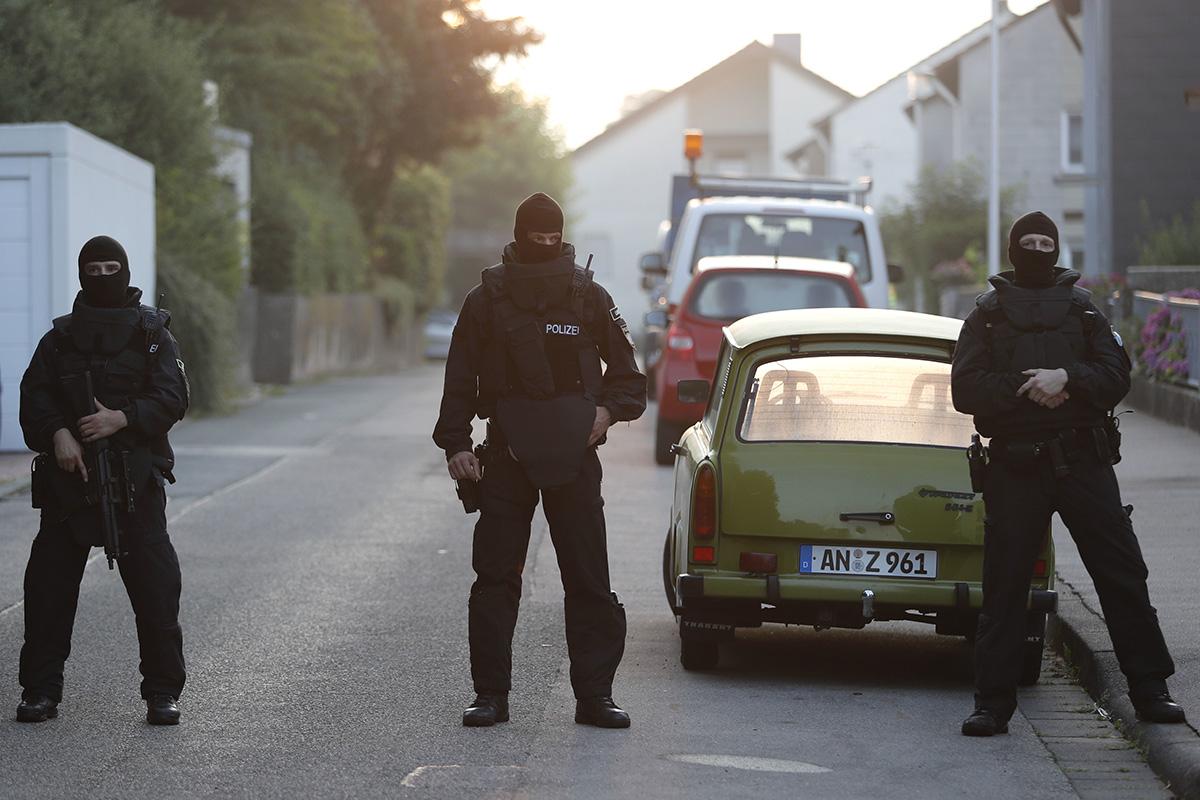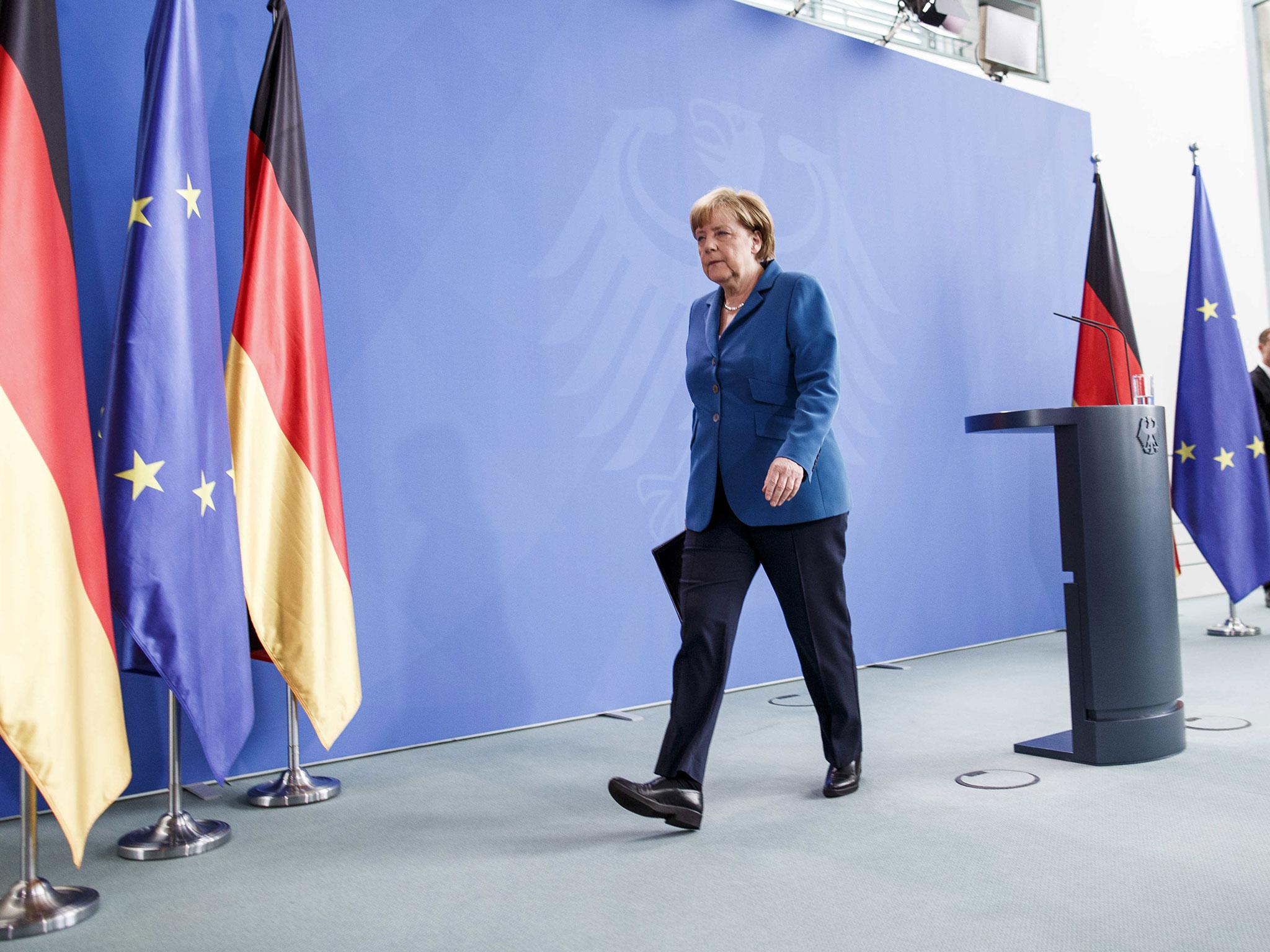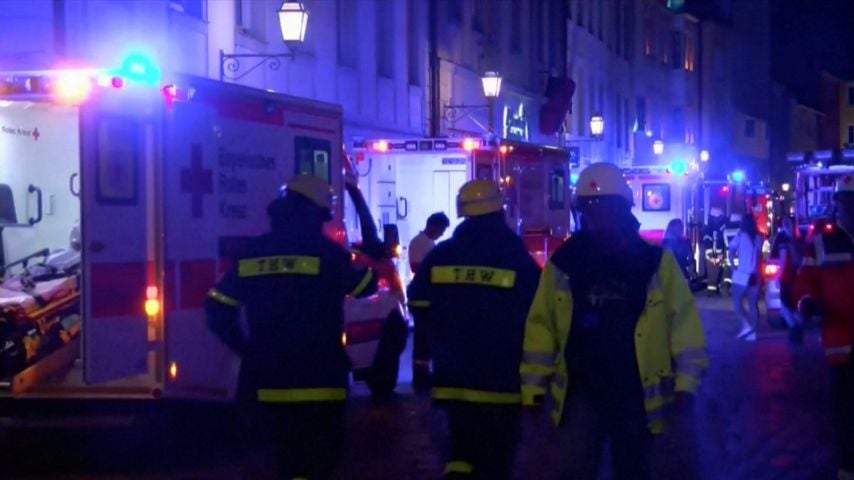Ansbach explosion: Angela Merkel under pressure over refugee policy after fourth attack in one week
A search of Mohammed Daleel's phone showed him pledging allegiance to Isis and its leader

Your support helps us to tell the story
From reproductive rights to climate change to Big Tech, The Independent is on the ground when the story is developing. Whether it's investigating the financials of Elon Musk's pro-Trump PAC or producing our latest documentary, 'The A Word', which shines a light on the American women fighting for reproductive rights, we know how important it is to parse out the facts from the messaging.
At such a critical moment in US history, we need reporters on the ground. Your donation allows us to keep sending journalists to speak to both sides of the story.
The Independent is trusted by Americans across the entire political spectrum. And unlike many other quality news outlets, we choose not to lock Americans out of our reporting and analysis with paywalls. We believe quality journalism should be available to everyone, paid for by those who can afford it.
Your support makes all the difference.The suicide bombing by a Syrian asylum seeker who had pledged allegiance to Isis – the fourth act of extreme violence in the country in a week – has led to shock in Germany with recriminations over Chancellor Angela Merkel’s controversial policy on refugees.
The bomber, named as Mohammad Daleel, blew himself up outside a crowded wine bar in Ansbach on Sunday evening injuring 15 people. He had earlier tried to gain entry, with his rucksack packed with explosive, to an open air music festival attended by 2,500 people; he had only been turned away because he did not have a ticket.
There was a yellow chalk outline on the ground where the 27-year-old Daleel had died instantly after detonating his bomb containing nails and shards of metal. “He would have taken many, many victims with him if he had managed to get into the festival, that is for sure”, said Roman Fertinger, deputy chief of police from nearby Nuremberg.
The Syrian was facing deportation to Bulgaria – the first state he had entered in Europe through Turkey – after being turned down twice in his attempt to seek asylum in Germany. A search of his room at a refugee centre in Ansbach led to the discovery of bomb making material and a video found on his phone showed him pledging allegiance to Isis and its leader. He was also found to have six Facebook accounts, some under false names, and the same number of sim cards for his mobile.
Bavaria’s security chief, Joachim Herrmann, disclosed that the footage also contained threats of “revenge” against Germany. He said: “A translation from Arabic shows that he expressly announces, in the name of Allah, and testifying his allegiance to Abu Bakr al-Baghdadi, a famous Islamist leader, an act of revenge against the Germans because they are getting in the way of Islam. I think that after this video, there’s no doubt that the attack was a terrorist attack with an Islamist background.”
Amaq news agency, a mouthpiece for Isis, declared that the attacker “was a soldier of the Islamic State who had acted in response to calls to target nations in the coalition” fighting the Islamist group.
The suicide bombing in Ansbach, a city of 40,000, came in the wake of an axe attack by a 17-year-old asylum-seeker, who claimed to be an Afghan but turned out to be a Pakistani, on passengers at a train near Wurzberg; the killing of nine people by German Iranian Ali David Sonboly in Munich and the hacking to death of a woman with a machete in the city of Reutlingen by a Syrian refugee.
The Wurzberg attacker had pledged allegiance to Isis; but no terrorist link had been found so far in the Munich and Reutlingen murders. However, critics immediately claimed that Chancellor Merkel’s policy of offering refuge to Syrians fleeing the country’s savage civil war had contributed to the upsurge of violence. Her decision had led to thousands of people, including other nationalities as well as Syrian, coming to Germany.

Challenged at a press conference in Berlin on whether Mrs Merkel’s assertion that “we can manage it” was unravelling, interior minister Thomas de Maiziere wanted to stress that none of those who had carried out the attacks over the last week were among refugees who had arrived after the announcement of the “open door” policy last Autumn. Thus, argued Mr de Maizere, the Chancellor’s policy could not be held responsible.
Mr de Maizere announced that security measures would be raised at train stations, airports and border areas across Germany. A US military garrison is based in Ansbach: all service personnel have been restricted to base or their homes for the time being.
Those in the vicinity of the blast said they counted themselves lucky to survive. Witness Kevin Krieger said: “We were on the festival grounds. A band was playing when suddenly there was a loud bang. We all looked back. A man from security ran to the entrance. There were two people on the ground. They had injuries to their heads and necks. I tried to comfort them. The police cleared the area. Nobody was screaming. The explosion was very loud and I felt the shock waves on my body.”
Daleel, a short and muscular man who invited fellow refugees at the centre where he stayed to call him “Rambo”, had arrived in Germany in August 2014 seeking asylum after registering as a refugee in Bulgaria and Austria. He was given temporary leave to remain in Ansbach, but in December 2014 the asylum application in Germany was refused and deportation to Bulgaria ordered.
The Syrian’s lawyers then produced medical certificates to prove that he was suffering from psychological instability and had spent some time in a psychiatric hospital. It was also claimed that he had twice attempted suicide. The deportation order was suspended, but it was reactivated again and proceedings started on 13 July this year.
One resident at the street in Ansbach where the refugee centre, Hotel Christi, is located said that Daleel had told her that his wife and children had been killed in the fighting in Syria. There was, however, no verification of this.

Another resident, Alireza Khodadadi, had discussed politics and religion with Daleel, who had expressed views opposed to Isis saying the organisation did not represent Islam: “He always said, ‘No, I am not with them, I don’t like them’,” she said. But Mr Khodadadi added that Daleel lacked credibility: “I think he had some issues because he told so many lies, so often without reason. He wanted to be the centre of attention, he needed attention.”
Mubariz Mahmood, a refugee from Pakistan, decried that an act of terrorism was carried out by an asylum seeker. “This is absolutely shameful. The German people are trying to help us and he gives thanks by trying to kill them. I don’t blame them for being angry about this and I would not be surprised if there are some bad reactions to this,” he said.
“Mohammad [Daleel] had never expressed any political opinion to me. He was confident that he would get asylum in Germany. He would not be deported to Bulgaria, he believed, because it’s a poor country and they would not have the money to look after refugees. I work here, at a McDonald’s, but this man made no effort, as far as I know, to find work.”
There had been complaints from some residents of Ansbach that the asylum seekers had made little effort to assimilate into German society. Seventeen from the centre had turned up at first for lessons in German, a woman pointed out, but this had dwindled to just two soon afterwards.
At Ansbach’s centre, Henrik Muller, a 37-year-old computer technician, reflected on the implications of what had happened: “People are now afraid and you can’t blame them for being afraid. I supported the initial plans to take in refugees, but there seemed to be no checks on who entered. Now people are suspicious of people they had tried to help, an ugly mood is developing in my country and I can only see it getting worse.”
Join our commenting forum
Join thought-provoking conversations, follow other Independent readers and see their replies
Comments